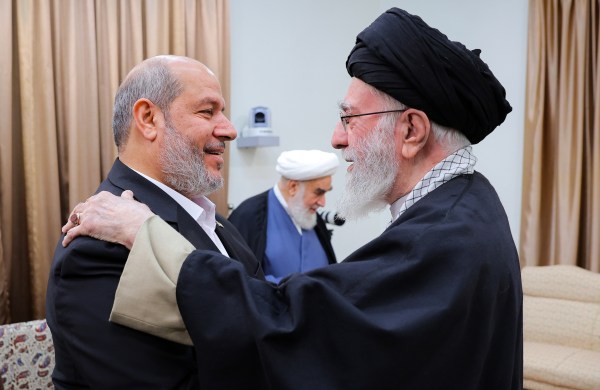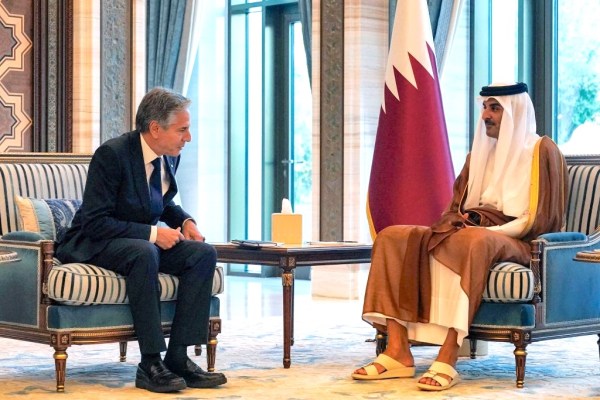Turn any article into a podcast. Upgrade now to start listening.
Premium Members can share articles with friends & family to bypass the paywall.
Happy Friday! It’s been a bleak few days, but we hope readers have a lovely weekend and spend time with their loved ones.
Quick Hits: Today’s Top Stories
- The shooter who killed conservative activist Charlie Kirk on Wednesday afternoon remains at large as of Friday morning, more than 40 hours after the shooting, with a multiagency manhunt underway. On Thursday, authorities released photos of a person of interest in the shooting and the FBI announced a $100,000 reward for information leading to the identification and arrest of the gunman. During a press conference Thursday evening, officials from the FBI and Utah Department of Public Safety gave no indication of knowing the shooter’s identity or having strong leads, and implored the public for help. Utah Department of Public Safety Commissioner Beau Mason presented additional footage of the suspected shooter, in which he runs across the rooftop, drops down to the ground, and walks away. Utah Gov. Spencer Cox said that authorities had received 7,000 leads and tips, adding that the FBI had received more “digital media tips” than in any instance since the manhunt for the 2013 Boston Marathon bomber. When asked by NBC if the shooter was still in Utah, Mason said, “We have no idea.” FBI director Kash Patel flew to Utah to assist in the manhunt but did not speak at the news conference. Vice President J.D. Vance arrived in Utah aboard Air Force Two on Thursday to pay respects to Kirk’s family and escort his casket back to Arizona, where Kirk lived with his wife and two young children. President Donald Trump said Thursday that he would posthumously award Kirk with the Presidential Medal of Freedom. Meanwhile, Rep. Anna Paulina Luna reportedly is calling for a statue of Kirk to be placed at the Capitol, and Deputy Secretary of State Christopher Landau implied that the State Department would review the legal status of immigrants who mock Kirk’s death.
- Law enforcement responded to threats at the U.S. Naval Academy on Thursday that prompted a lockdown and resulted in one midshipman being shot after he mistook officers for intruders during building searches. The shooting occurred after the midshipman struck an officer with the head of a training rifle while sheltering in place due to threats related to online posts from an expelled former student. Separately, U.S. Capitol Police responded to a bomb threat at the Democratic National Committee’s Washington, D.C., headquarters on Thursday, deeming it non-credible after sweeping the building.
- On Thursday, Brazil’s Supreme Court sentenced former President Jair Bolsonaro to 27 years and three months in prison, after finding him guilty of five counts related to his efforts to reverse the 2022 presidential election results, including taking part in an armed criminal organization, committing violent acts against state institutions, and damaging protected public property. Prosecutors alleged that Bolsonaro and his supporters considered assassinating current President Luiz Inácio Lula da Silva, as well as Lula’s vice president and a Supreme Court justice. Bolsonaro’s co-conspirators—including his former defense minister and 2022—were also sentenced for their involvement in the attempted coup. Trump said he was “very unhappy” with the ruling, with Marco Rubio writing on X that “The United States will respond accordingly to this witch hunt.”
- Venezuelan Interior Minister Diosdado Cabello said on Thursday that after a government investigation, his country believes that none of the 11 people killed in a U.S. military strike on a boat in the Caribbean last week were members of the gang Tren de Aragua, as the U.S. claims. “A murder has been committed against a group of citizens using lethal force,” said Cabello. The White House has offered few additional details about the strikes beyond claiming that the boat was transporting illegal narcotics. The Venezuelan military made further troop deployments throughout the country on Thursday in response to the presence of U.S. Naval assets off the country’s coast, a mission which began in August.
- Belarusian President Alexander Lukashenko freed 52 prisoners on Thursday at the urging of Trump and following negotiations with a U.S. delegation. Those released included a European Union employee and multiple critics of Lukashenko’s autocratic regime, including Belarusian opposition politician Mikola Statkevich, who refused to cross the border into Lithuania with the other detainees on Thursday in apparent protest against what would be de facto political exile. In return, the U.S. eased sanctions on Belarus’ state-run airline, Belavia. White House official John Coale, who met with Lukashenko on Thursday, said that the U.S. would “continue to work to free the nearly 1,300 remaining political prisoners in Belarus.”
- Nadine Menendez, the wife of former U.S. Sen. Bob Menendez, was sentenced to four-and-a-half years in prison on Thursday for colluding with her husband to sell influence in exchange for money, gold, and a luxury car. “I put my life in his hands and he strung me like a puppet,” said Nadine Menendez, who told the court that her husband made her feel compelled to assist in his crimes, although she said she did not plan to divorce him. The former senator, who was sentenced in January, is serving an 11-year sentence.
- Foreign Office Minister Stephen Doughty announced in the House of Commons Thursday that Prime Minister Keir Starmer had withdrawn Lord Peter Mandelson as British ambassador to the United States following revelations about his relationship with Jeffrey Epstein. On Wednesday, Bloomberg published emails showing Mandelson expressed support for Epstein and suggested his conviction was wrongful, which officials said was materially different from what was known at his appointment. Starmer had initially backed Mandelson following the release of a birthday book in which Mandelson called Epstein his “best pal.”
- NASA press secretary Bethany Stevens confirmed Wednesday that the agency had blocked Chinese nationals from accessing its facilities and internal networks. The Wolf Amendment has prohibited NASA from bilateral cooperation with China since 2011, but Chinese nationals previously worked as contractors and university researchers on agency projects. It’s unclear whether the restriction will extend to multilateral conferences. “We’re in a second space race right now,” NASA’s acting administrator Sean Duffy said Wednesday, reiterating efforts to return American astronauts to the moon before China achieves a moon landing. NASA is seeking to accomplish a crewed lunar landing by 2027, through its Artemis mission, while Beijing plans to send astronauts to the moon by 2030.
- More than 300 South Korean workers who had been detained by an Immigration and Customs Enforcement raid on a Hyundai battery plant in Georgia departed the U.S. on Thursday. As part of an agreement between the U.S. and South Korean governments, the workers were set to return on Wednesday, but Korean media reported that Trump had directed Secretary of State Marco Rubio to extend an offer for the workers to remain in the United States. Korean Foreign Minister Cho Hyun said that the workers were “shocked and exhausted” and preferred to return home first before taking up the U.S. on any potential offer.
- Senate Minority Leader Chuck Schumer, said Wednesday that the GOP proposal to fund the government would not get Democratic votes in the upper chamber, upping the chance of a government shutdown on the October 1 deadline. Democratic leaders have reportedly coalesced around a plan to threaten to shut down the government in an effort to restore expiring health insurance subsidies. “What the Republicans have proposed is not good enough to meet the needs of the American people and not good enough to get our votes,” said Schumer.
A message from Political Wire
Concise. Relevant. To the Point.
Political Wire is where serious political junkies stay ahead. Join thousands of insiders who rely on Taegan Goddard’s exclusive analysis, a 24/7 trending news feed, bonus newsletters and a completely ad-free experience. The site is free to visit and the community is free to join—but membership gives you the edge. Use coupon code “dispatch” for 20% off an annual plan. Get Insider Access.
No Safe Harbor

Israel issued a clear signal to Hamas terrorists earlier this week: You can no longer rely on Qatar for sanctuary. By noon on Tuesday—as a delegation of Hamas leaders met in Qatar’s capital of Doha to discuss a U.S.-proposed ceasefire agreement—Israeli Prime Minister Benjamin Netanyahu had authorized airstrikes on the gathering, with at least 10 Israeli jets firing long-range “over the horizon” missiles into the building in the city’s northern suburbs. According to the Wall Street Journal, it was the same house where Hamas leaders celebrated the October 7 attacks. Explosions echoed through the city.
Later that day, Hamas announced that the strike killed five of its members—including Himam al-Hayya, the son of lead negotiator Khalil al-Hayya—but did not eliminate any senior officials. The attack also killed a Qatari security official.
There’s reason to be skeptical of Hamas’ claims—the organization has, at times, denied the deaths of senior leaders, only to acknowledge months later that they were killed—but Israeli media also reported, quoting an unnamed Israeli official, that “there’s no indication that the terrorists were killed.” The source added that while the assessment is still ongoing, “optimism is fading.”
As a non-paying reader, you are receiving a truncated version of The Morning Dispatch. You can read our full item in the members-only version of TMD.
Either way, the operation is a marked change in the war, signaling Israel’s willingness to strike targets inside a U.S. ally—and seemingly without White House sanction. According to reporting in the Wall Street Journal, Israel only informed the administration of the strikes minutes beforehand, without providing the exact target or location. White House press secretary Karoline Leavitt said that Middle East envoy Steve Witkoff gave advance warning to the Qataris, but Qatari Foreign Ministry spokesperson Majed al-Ansari dismissed this, writing on X that the communication arrived as the attack was ongoing.
On Wednesday, Netanyahu emphasized that the attack sends a clear message: “I say to Qatar and all nations who harbor terrorists, you either expel them or you bring them to justice. Because if you don’t, we will.”
According to Jonathan Schanzer, the executive director at the Foundation for Defense of Democracies and a former Treasury Department official who froze Hamas funding schemes, Netanyahu determined “probably two years ago, that eventually this was going to happen.” But the target of Israel’s strike “are not political figures as it is commonly advertised,” he told TMD. “Every one of them has operational history with Hamas. Every one of them has blood on their hands. … So it was, in my view, inevitable.” Al-Hayya is one such example, he added. Hamas’ chief negotiator currently serves as one of the five leaders that comprise the terrorist group’s acting leadership council and—as the New York Times reported in October 2024—was involved in planning the October 7 attack on Israel.
In recent years, Israel has demonstrated it will not shy away from targeting exposed terrorists, even if they’re within a foreign country’s borders. On August 28, Israel killed the Houthi government’s prime minister, Ahmed al-Rahawi, and other unnamed high-ranking officials in a targeted strike on Yemen’s Houthi-controlled capital of Sanaa, the terrorist group confirmed at the time. In September 2024, Israel struck the underground Hezbollah terrorist command center in Lebanon’s capital city, Beirut, killing the group’s longtime leader, Hassan Nasrallah. A month earlier, when Hamas’ top-ranking political leader, Ismail Haniyeh, traveled to Tehran to attend the inauguration of Iranian President Masoud Pezeshkian, Israel carried out a successful assassination by detonating explosives that were previously planted inside his guesthouse.
“I think it is the product of October 7,” Elliott Abrams, a senior fellow for Middle East studies at the Council on Foreign Relations who served in the three presidential administrations, told TMD. “The Israelis have made the decision that leaders of Hamas are simply not going to gain immunity based on geography. They can be hidden in Gaza, they can be hidden in Doha.” He added, “I think we’ll find out over the next year they can be hit elsewhere as well.”
Andreas Krieg, a senior lecturer at King’s College London and fellow at the Institute of Middle Eastern Studies, pointed out another possible reason: that Netanyahu is attempting to “undermine Qatar’s standing in Washington, because Qatar is very relevant in Washington because of its mediation role,” he told TMD. “So, if you torpedo the mediation, you basically relegate Qatar’s importance in Washington.”
In May, Trump signed an economic deal with Qatar “to generate an economic exchange worth at least $1.2 trillion,” the White House stated in a fact sheet at the time. Meanwhile, Qatar also gifted Trump a luxury jumbo jet—an “unconditional donation,” per the White House, valued at approximately $400 million—which, as CBS News reported in late July, is currently being prepared to serve as Air Force One.
The largest U.S. military base in the Middle East is also in Qatar, located approximately 20 miles southwest of Doha, where about 10,000 U.S. service members are stationed. As Kristian Coates Ulrichsen, a Baker Institute fellow for the Middle East who specializes in the Persian Gulf region, similarly told TMD, “The Qataris have put a lot of investment into making sure the relationship was stronger, but now we’ll probably test the durability, the resilience, of that relationship.”
Responding publicly to Israel’s strike in a social media post on Tuesday, Trump said he gave his assurance to Qatari leaders that “such a thing will not happen again on their soil.” He wrote, “Unilaterally bombing inside Qatar, a Sovereign Nation and close Ally of the United States, that is working very hard and bravely taking risks with us to broker Peace, does not advance Israel or America’s goals.” Still, the president added, “eliminating Hamas, who have profited off the misery of those living in Gaza, is a worthy goal.” However, he displayed a more disgruntled tone later that night, telling reporters he was “very unhappy about every aspect.”
Unnamed senior U.S. officials told Axios on Tuesday that, in a phone call with Netanyahu on Tuesday, Trump said the attacks within Qatar’s borders are “unacceptable,” adding, “I demand that you do not repeat it.” The Wall Street Journal also reported that the two leaders held a second call later that day, which it described as “cordial.” Qatari Prime Minister Sheikh Mohammed bin Abdulrahman al-Thani is expected to meet with Trump and Secretary of State Marco Rubio at the White House later today.
Trump may be displeased at Israel’s incursion into Qatar’s territory, but, as Schanzer noted, “The president does not seem to be particularly beholden to Qatar when it comes to their support for Hamas,” adding that his statements have been “very carefully crafted.” The broader concern is that, even as Qatar works to strengthen ties with the U.S., it’s still associating with—and hosting—the wrong crowd. “Hamas is not the only terrorist organization that they host,” Schanzer said, but one of many others, including the Taliban, al-Qaeda, the Islamic State, and the Muslim Brotherhood.
“Qatar is a country which tries to position itself between adversaries: Between Iran and Israel, between the U.S. and Iran, [and] between the Taliban and the United States,” Michael Singh, the managing director and senior fellow at the Washington Institute for Near East Policy, explained to TMD. “And it tries to carve out—and frankly, has tried with success—to carve out this role for itself as a sort of neutral, mediating party, as a country which is useful to all sides, and that has afforded Qatar a measure of protection.”
Still, Krieg questioned why Israel would take such aggressive action, given that it could further imperil the hostages while Qatar is mediating ceasefire negotiations. Hamas holds an estimated 20 living Israeli hostages, and protesters across Israel continually call for the government to prioritize bringing them home over any other objective. During a televised speech on Thursday, Hamas official Fawzi Barhoum called the strike “an assassination of the entire negotiation process.”
“If your policy is, ‘We want the hostages back and we realize the military alone cannot deliver,’” Krieg explained, “then you can’t kill the only mediator or negotiator that you have on the Hamas side, whether he’s part or not part of a terrorist organization, because you cannot kill every single Hamas operative.”
Perhaps it’s because Netanyahu no longer believes that Hamas is willing to release most or any of the captives. “The Israelis began to realize that there was very little risk in targeting these leaders, from the perspective of the hostages,” Schanzer said, “that the outcome was very likely going to be the same.”
As Raphael Cohen, director of the RAND Corporation’s Public Policy National Security Program, told TMD, “The bottom line takeaway of the is that the event sort of underscores how Israel’s conception of how this war ends looks very, very different than how Europe believes that this war was going to end, and how the Arab States believe this war is going to end, and how elements of the United States think this war should end.” The key difference, Cohen said, is that the “Netanyahu government believes the war should result in Hamas’ capitulation.”
“And, if they don’t capitulate,” he added, “then … well, they’ll die.”
Today’s Must-Read
My car shoots down the road, gliding over cattle guard bars and ill-maintained, infrequently traveled asphalt. Nothing, for miles. Blessed nothing. If you encountered a patrolman or sheriff’s deputy in these parts they’d race you to the end of the valley for the fun of it. You can feel the roar of the engine as you push forward, the wind blowing against the body of your vehicle. Red and salmon-colored cliffs rise in the far distance, rays of sunshine burst through the clouds and strike the bluffs and the plains as if God Himself opened the gates of heaven especially for the few dozen souls residing in the vast expanse. In Paradox Valley, nestled along the border of Utah and Colorado, Lady Liberty makes her case. It’s a strong one.
Toeing the Company Line
Pyromania
Charlie Kirk and doing politics ‘the right way.’
Weakness Is Provocative
Putin’s escalation in Poland ushers in a dangerous new phase in the Ukraine war.
A Deeper Strain of Political Violence
The past year has seen attacks on public figures, institutions, and now, an activist.
The Face of the Young Right
Charlie Kirk inspired a generation of activists who will shape politics, culture, and the media.
Charlie Kirk’s Death | Roundtable
Is political violence part of our culture?
Worth Your Time
- In the wake of Charlie Kirk’s murder, many writers have written tributes to the late activist and essays on this moment of political violence. TMD recommends Vice President J.D. Vance’s tribute on X, Adam Rubenstein’s “The Charlie Kirk I Knew” in the Free Press, Matt Welch’s “What If We Acted Like Political Violence Was a Problem?,” in Reason, George Packer’s “The Tragedy of Charlie Kirk’s Killing” and Graeme Wood’s “Political Violence Could Devour Us All” in The Atlantic, Ezra Klein’s “Charlie Kirk Was Practicing Politics the Right Way” and Ross Douthat’s “How Charlie Kirk Remade Campus Conservatism” in the New York Times, Megan McArdle’s “From a sucker punch to Charlie Kirk’s death” and George Will’s “William F. Buckley would recognize Charlie Kirk as a kindred spirit” in the Washington Post, and Jerusalem Demsas’ “A man was murdered” in The Argument.
Presented Without Comment
New York Times: Trump Threatens To Sue the Times Over Reporting on Epstein Drawing
Also Presented Without Comment
New York Post: Disgraced Ex-Rep. Madison Cawthorn Arrested Days After Announcing Political Comeback Plot
Also Also Presented Without Comment
NBC News: Dog Cast Ballots in Two California Elections
Let Us Know
Have any thoughts or questions about today’s newsletter? Drop us a note in the comments!

















Please note that we at The Dispatch hold ourselves, our work, and our commenters to a higher standard than other places on the internet. We welcome comments that foster genuine debate or discussion—including comments critical of us or our work—but responses that include ad hominem attacks on fellow Dispatch members or are intended to stoke fear and anger may be moderated.
With your membership, you only have the ability to comment on The Morning Dispatch articles. Consider upgrading to join the conversation everywhere.